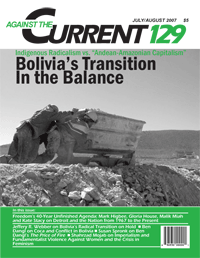Against the Current, No. 129, July/August 2007
-
Deferred Freedom Agenda
— The Editors -
Race and Class: Facing the New Backlash
— Malik Miah -
Memoirs of a 1960s Activist
— Gloria House -
July 1967: Rebellion
— Kate Stacy -
Voices of Iraqi Workers
— Traven Leyshon -
It's Political Not Personal
— Paula Chakravartty and Stephanie Luce -
How to Resist Sarkozy?
— Peter Drucker -
Women's NGOs Under Conditions of Occupation and War
— Shahrzad Mojab -
Bolivia: Transition on Hold
— Jeffery R. Webber -
Coca and Conflict in Bolivia
— Benjamin Dangl -
Bolivia's Long Revolution
— Susan Spronk - Reviews
-
A Nation at Canaan's Edge
— Mark Higbee -
Artistry Serving Activism
— Paul Le Blanc -
Speaking for New Orleans
— Christian Roselund -
Unselling War
— Dianne Feeley -
A Revolutionary Life
— Alan Wald -
On String Theory
— Ansar Fayyazuddin - In Memoriam
-
Martin Seldon, 1923-2007
— Christopher Phelps
Dianne Feeley
10 Excellent Reasons
Not to Join the Military
introduction by Cindy Sheehan
edited by Elizabeth Weill-Greenberg
NY: New Press, 2006, 157 pages, $14.95 paper.
TWO-THIRDS OF those who join the U.S. military are looking to enlarge career options or get benefits that will enable them to go to college. In examining the military recruitment ads included in 10 Excellent Reasons Not to Join the Military, one might conclude a third reason is in response to “you can be all that you can be,” or to find a place in society where equality, personal courage, integrity and loyalty are valued.
10 Excellent Reasons Not to Join the Military is a collection of articles that reveal how promises offered by military recruiters are hype. Reality is quite different, as the articles detail. But by the time the recruit discovers war without end it’s next to impossible to extricate oneself.
The articles are written by veterans, mothers whose children were in the military, and activists working in advocacy organizations as well as professional writers. The best information comes from soldiers and their families, or in the stories activists and writers tell to illustrate precisely how the business of the military is war.
Cindy Sheehan is the best known of the mothers who have exposed the hypocrisy of a military machine that sends its youth into war on the basis of lies. She has written both the introduction and a moving article about her accompaniment with her son once he joined the military. Casey had been told by his recruiter he’d never see combat — he’d only be in a support role. He was killed in combat five days after he arrived in Iraq. Her message: Recruiters lie so don’t believe them, die and put your mom in hell.
More of the stories are about what happens when soldiers survive, but can’t forget what they saw and did. Paul Rockwell recounts stories of those who worked at Abu Ghraib, who killed unarmed civilians, who witnessed “the nicest guys” turn violent. He reminds us that war crimes in Iraq “are not mere aberrations. They emanate from official policies regarding the aims and conduct of the occupation.” (30)
Tod Ensign outlines a series of long-term health problems soldiers face — articularly post-traumatic stress disorder, which already has affected at least 17% of Iraqi war vets.
Robert Acosta, who lost his hand and sustained other injuries in Iraq, summarizes his experience by noting that “The military doesn’t care about you — you’re just a number, a chess piece.” (43)
As someone active in counter-recruitment work, I would recommend this book to parents, high school teachers and counselors, as well as students considering the military as a possibility. 10 Excellent Reasons Not to Join the Military ends with a chapter by Rae Abileah emphasizing that there are alternatives to joining the military. A few are listed in the resource guide.
ATC 129, July-August 2007

